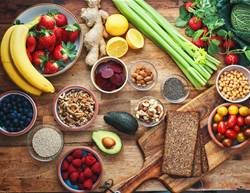Your gut microbiome plays a huge role your digestive system health, as well as in our overall health. It's linked to everything from mood and energy through to immunity and risk of chronic disease.
While we're still learning about gut health, we do know that you can improve it through a healthy lifestyle and eating the right foods. Here's how.
1. Make sleep a priority
Research shows that people who get more sleep or have a high sleep efficiency (meaning they fall asleep quickly and stay asleep) have a more diverse mix of bacteria in their guts than people who sleep less or have more frequently interrupted sleep.
What’s more, changes in your circadian rhythm (because of things like switching time zones or working nights during the week but not on weekends) can cause shifts in your microbiome. If strategies like having a quiet, screen-free wind-down routine; keeping your bedroom dark and cool; and using comfy bedding don’t help, you may want to see a sleep specialist to improve your shut-eye.
2. Keep a lid on stress
Stress can wreak havoc on your gut health. Some immediate side effects of unmanaged stress include loss of appetite, nausea, and diarrhoea; over time stress can worsen conditions like irritable bowel syndrome.
Though it’s not always possible to remove stressors from your life, adopting tools such as diaphragmatic breathing and yoga can help, says gastroenterologist Dr Douglas A. Drossman. “It’s also a wise idea to consider visiting a mental health provider to determine whether brain-gut therapies like cognitive behavioural treatment, hypnosis, and mindfulness can be used,” he adds.
3. Walk more
According to a meta-analysis of research examining the effects of exercise on gastric emptying (the process by which food moves from the stomach to the small intestine), short bouts of low-intensity exercise make the process go faster. That means a leisurely walk after lunch or dinner could be the push your body needs to up its digestion game. It could also aid in post-meal blood sugar management.
4. Be smart about antibiotics
“If you take antibiotics to kill the bacteria that cause, say, a urinary tract infection, the bacteria in your gut also suffer,” says microbiome researcher Purna Kashyap.
That doesn’t mean you should avoid antibiotics when you need them, as bacteria often will recover after a course of antibiotics. Help them along by eating a high-fibre diet to support greater diversity of bacteria in your gut. This can make it easier for those bacteria to recover.
5. Keep a gut-health journal
If you’re regularly struggling with gut issues like constipation and cramping, start keeping track of what you eat and drink as well as your exercise, sleep, and any symptoms you’re experiencing; then bring this log with you to your doctor. Together, you and your doctor may be able to analyse your habits and pinpoint potential problems.
6. Eat at the same times every day
A consistent eating schedule can help promote optimal digestion and regulate hunger hormones. “If there’s too much time between meals, your body may signal that you’re ravenous and you can be more likely to overconsume at the next meal, resulting in bloating and discomfort,” says dietitian Nichole Dandrea-Russert.
7. Monitor your vitamin D levels
Multiple studies have shown that not having enough vitamin D can increase your risk of developing certain conditions including inflammatory bowel disease. A vegan diet or lack of sun exposure can affect your vitamin D levels, which may lead to a weakening of the intestinal walls called leaky gut, so ask your doctor if they recommend checking your D and/or taking a supplement.
The gut health cheat sheet
What you eat matters for your gut health, and some foods can get in the way: cut down on fried foods, ultra-processed foods, red and processed meats, alcohol and sugary drinks, which can negatively impact gut health. Then build these top picks into your regular meal rotation.
Yoghurt and kefir
Yoghurt and its liquidy relative kefir (a fermented dairy product) are rich in probiotics that contribute to overall gut health and help prevent GI symptoms such as bloating, gas, constipation and diarrhoea. Not all yoghurts contain live probiotics, so read labels and look for specific strains (commonly L. acidophilus and Bifidobacterium sp.). Also, opt for a high-protein yoghurt with minimal added sugars.
Bananas
This breakfast staple nourishes your gut thanks to the prebiotic inulin, which helps feed the good bacteria there. If you struggle with bathroom issues such as constipation and diarrhoea, bananas may help by improving your stool consistency and overall bowel function.
Lentils
Legumes such as lentils and beans are rich in folate, iron, and B vitamins, all of which support gut microbiome balance and function. They are also a source of resistant starch, a type of carbohydrate that ferments in the large intestine and acts like a prebiotic to fuel the growth of good bacteria. As a bonus, they’re a great way to get plant-based protein, which studies suggest can help reduce inflammation and is beneficial to general gut health.
Tempeh
If you’re looking for a tangy, nutty way to introduce good bacteria into your gut, try tempeh. This fermented soybean product is rich in plant protein as well as both probiotics and prebiotics that positively influence the gut microbiome. (Note: When cooking tempeh, be sure to keep the internal temperature below 46°C to ensure that the live cultures stay intact.)
Berries
These tasty little fruits contain antioxidants that help reduce inflammation in the gut and maintain overall gut health. Also, berries are rich in prebiotics and eating them is one of the best ways to get vitamin C, which can strengthen the gut barrier for better nutrient absorption.
Oats
This whole grain is packed with beta-glucan, a type of soluble fibre that helps stabilise blood sugar levels for better gut health and overall health. This type of fiber also promotes steady energy and satisfies hunger because when eaten it forms a gel-like substance that moves through the digestive tract slowly.
Kimchi and sauerkraut
These fermented-cabbage condiments feature gut-supporting postbiotics and are packed with flavour.
Read more on the above in our coverage around four key things to know about gut health.



.jpg&h=90&w=90&c=1&s=1)






